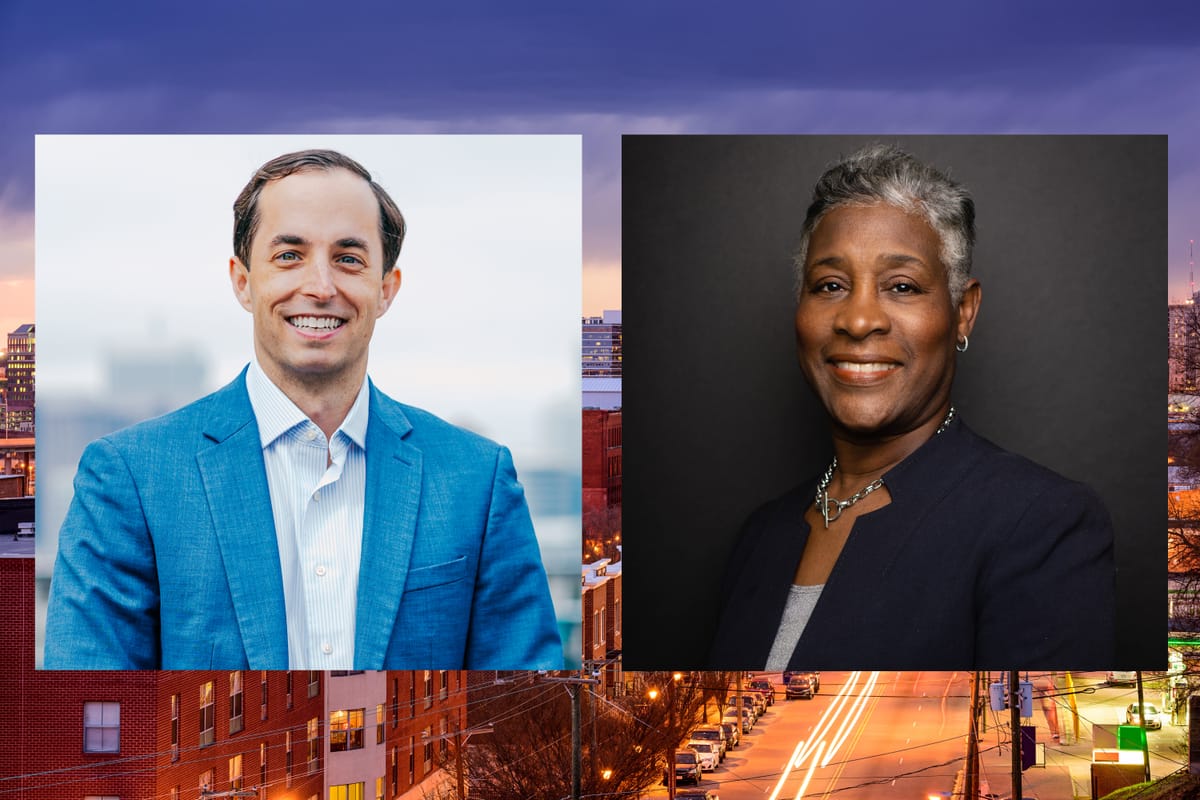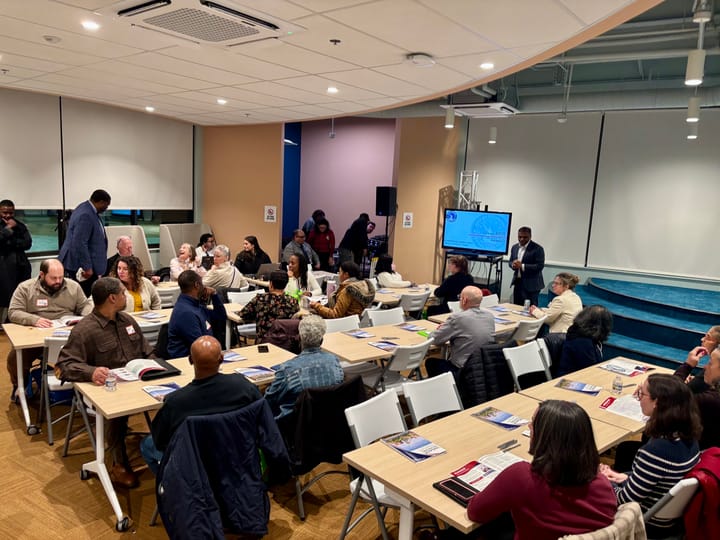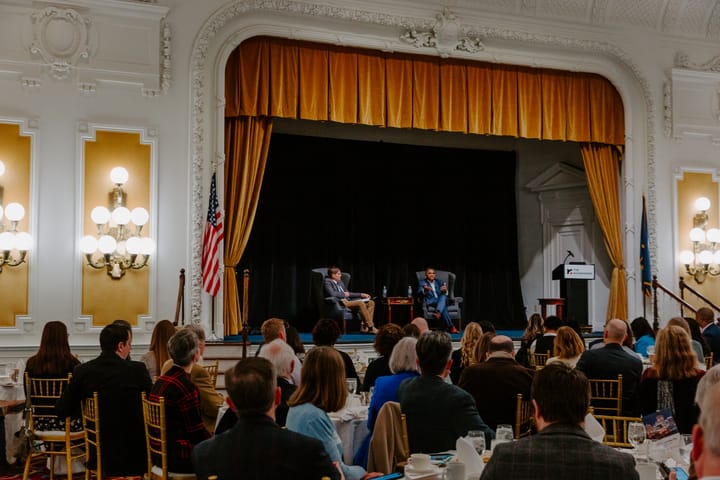McEachin, Barbour set for primary rematch in Richmond commonwealth’s attorney race

Four years after losing a primary challenge against Richmond Commonwealth’s Attorney Colette McEachin, Richmond lawyer Tom Barbour is taking another shot at unseating the city’s top prosecutor.
The two candidates are competing in a Democratic primary on June 17, and the winner will be a virtual lock to win the general election in a heavily Democratic city where Republicans rarely bother to field candidates.
McEachin ran unopposed in the 2021 general election after winning more than 73% of the primary vote against Barbour that year, when Barbour ran as a progressive challenger and accused McEachin of having outdated views on criminal justice.
The battle lines are a little different in 2025. Barbour is campaigning on a platform of bringing a more proactive approach to using the prosecutor’s office to tackle city problems like traffic safety, gun violence and public corruption. McEachin, he argues, is too willing to accept the status quo.
“I think we’re stagnating,” he said in an interview when asked for his views on Richmond’s public safety trends. “And it’s because we’ve got a commonwealth’s attorney’s office that’s out of touch.”
McEachin is largely running on her experience and crime statistics that show violent crime in Richmond has fallen during her tenure, which began in 2019.
“What I bring to this job is decades of experience actually prosecuting felony crimes at all levels in the city of Richmond,” McEachin said in an interview. “And Tom Barbour is woefully inexperienced at doing any of that.”
McEachin, 69, became Richmond’s chief prosecutor when former commonwealth’s attorney Mike Herring stepped down for a job at the McGuireWoods law firm. She is the widow of the late state senator and congressman Donald McEachin, who died in 2022 after a battle with cancer.
Coming from a family steeped in politics, McEachin has big-name endorsements from U.S. Sen. Tim Kaine, D-Va., Democratic gubernatorial nominee Abigail Spanberger, U.S. Rep. Jennifer McClellan, D-Richmond, and numerous other state and local leaders.
As of March 31, McEachin had reported having nearly $77,500 banked for her campaign, compared to about $43,600 for Barbour.
Barbour’s endorsements are more local. His backers include City Council member Andrew Breton (1st District), School Board Member Ali Faruk (3rd District) and several other former city officeholders and activists.
Barbour, a 40-year-old criminal defense attorney whose wife works as a public defender, previously worked in the prosecutor’s office as a policy advisor under Herring. He says he came to Richmond as a “differently situated young lawyer” after serving as a captain in the U.S. Marine Corps, which involved embedding with the Iraqi army and Afghan border police.
“Anything that you see the Richmond Police Department doing I have either personally probably done it, or I have trained people to do that work,” Barbour said.
At a recent debate held by the Richmond City Democratic Committee, McEachin dismissed Barbour’s military experience as irrelevant to the job he’s running for.
“I find it laughable that Mr. Barbour would say that his experience policing people in a military operation has anything to do with providing public safety to the city of Richmond,” she said.
McEachin has also downplayed Barbour’s previous role in the office she now leads, stressing he only worked as a prosecutor for 10 months while she’s done it for more than two decades.
Barbour said that in his role as a trial attorney, he’s always on the side of tenants in housing cases and always on the side of workers in employment disputes. He also has a small nonprofit that aims to connect people with services to reduce recidivism and gain stability to avoid future encounters with the criminal justice system.
He said he sees himself as a “well-rounded public safety professional” that could bring a more dynamic approach to the office.
“I’m running because I think we’re missing significant opportunities for public safety in Richmond,” Barbour said.
Crime trends
Though crime spiked nationwide during the COVID-19 pandemic, McEachin says Richmond’s data shows her office has been effective on the public safety front.
In 2019, the city logged 1,201 violent crimes. Last year, that number was 967, which Police Chief Rick Edwards characterized as a remarkably low figure during a crime briefing earlier this year.
Property crimes have risen under McEachin’s tenure, rising from 8,541 in 2019 to 9,301 in 2024. She said that mostly reflects increases in thefts from vehicles and shoplifting from ABC stores and dollar stores.
“No one wants any segment, either the violent crimes or the property crimes, to go up, McEachin said. “But if I have my druthers? If I have to choose? I would prefer it to be a person’s property and not their body.”
Barbour said there’s still a perception among outsiders that Richmond is dangerous, a view that could be better combated with more focus by the prosecutor’s office.
Richmond’s efforts to become more friendly to pedestrians and bicyclists, he said, won’t work without “good traffic enforcement.” Similarly, he said, the number of shootings also inhibits Richmond’s success.
“You can’t have continued development of business and places to eat and places to enjoy with your family and friends if you have intractable gun violence,” he said.
Gun violence
Barbour has specifically faulted McEachin for not making more use of Virginia’s red flag law, which the General Assembly passed in 2020 in an attempt to prevent mass shootings and violence perpetrated by people showing warning signs of potentially dangerous behavior. The law allows authorities to temporarily seize guns from people believed to be a threat to themselves or others.
McEachin said there have been a handful of cases of the red flag law being used in Richmond, mostly by potential victims of domestic violence when the suspected abuser is known to have a gun. Barbour argues she should be doing a lot more, stressing that state law empowers prosecutors to initiate red flag orders against potentially dangerous people rather than relying on citizens to start the process.
“The office currently doesn’t view itself as a stakeholder to real-time gun violence prevention,” he said. “It views its job to sit there and wait for a case to come in and then prosecute that case. But by the time a case comes in, we’ve already lost one life or someone’s already been seriously injured.”
In addition to pursuing more red flag orders, Barbour said the prosecutor’s office should be a more “proactive stakeholder” in the city’s efforts to prevent shootings before they happen.
“The commonwealth’s attorney has to be involved with intervening early with people who are at high risk of involvement in gun violence,” Barbour said.
McEachin said Virginia’s red flag law was designed as a “preventative measure” that wouldn’t be particularly effective in dealing with the type of shootings seen in Richmond.
“They’re not being used to prevent felons from getting firearms,” she said, adding that city police mostly confiscate firearms through the normal course of investigating crimes involving guns.
At the debate, McEachin argued her power is limited because the red flag process required a law enforcement investigation before her office can seek a red flag order.
“They can’t just come in on somebody’s word and take a gun,” McEachin said.
When the law was being debated in the state legislature, Republicans criticized it as allowing authorities to take guns based solely on the word of someone seeking a red flag order. The purpose of the law was to give police and prosecutors more power to act on warnings from family members, romantic partners and mental health professionals, without the type of time-intensive investigation needed to prove a crime was committed.
Traffic safety
Barbour has also argued the city could get tougher on drivers involved in serious traffic accidents.
“I think we're not really taking reckless driving and traffic violence seriously,” he said. “It's making our streets dangerous.”
He has suggested putting drivers on probation for six months for reckless driving offenses involving speed more than 20 miles per hour over the posted limit, which would leave them with a restricted license until they can show they’ve learned to drive safely. Under the current system, he said, drivers can simply take an online safety class and have a reckless driving charge dismissed.
“Richmond’s courtrooms are the most lax on enforcement that I have seen, and I think that’s generally known and understood,” he said. “The first thing we need to do is actually aggressively prosecute reckless driving and speeding on local roads.”
Barbour has pointed to two high-profile incidents — the recent car vs. bicycle collision involving Mary Munford Elementary School Principal Greg Muzik and the 2023 crash that killed VCU student Shawn Soares — as examples of how Richmond is soft on drivers. Both of those cases, Barbour contends, could have been presented to a grand jury to see if serious charges were warranted.
The two drivers involved in the Soares crash were charged with traffic offenses, but there were no criminal charges related to the death. No charges were filed against the driver in the Muzik collision.
McEachin said Barbour is attempting to seize on emotions surrounding the Muzik case and the not necessarily correct assumption that the driver of the car that hit Muzik’s bicycle must have been at fault.
“Tom just feeds into that flame,” she said. “And that is not the job of a prosecutor. The job of a prosecutor is to step back, look at the evidence, look at the law, and see whether or not there is in fact a violation of the law that should be prosecuted. And in that case, there was not.”
Speeding is a multifaceted issue, McEachin said, involving road design, enforcement by city police and a “crash team” her office has formed to dig into the specifics of serious crashes. But not every traffic-related tragedy, she said, is a “felonious event.”
“You have to look at each of those circumstances individually and not let your emotions or the public emotion sway your independent, cool-headed review as a prosecutor,” she said. “And that's what Tom doesn't get.”
Restorative justice
McEachin often emphasizes that her office isn’t interested in using incarceration as the first or only way to change someone’s behavior, pointing to “restorative justice” initiatives she’s launched over the last few years through her office’s Community Justice Reform Unit.
The incumbent has also faulted Barbour for allegedly failing to understand Richmonders and crime victims want “some level of accountability” for misconduct.
“Accountability does not necessarily mean that everybody gets locked up on their first offense for the most non-serious offense,” McEachin said. “We’re not throwing people convicted of petty larceny in the Richmond city jail for 12 months.”
Barbour has characterized McEachin’s criminal justice reform efforts as lackluster, stressing that only about 20 people have gone through the main restorative justice program that McEachin founded in 2021 that tries to seek reconciliation between offenders and their victims that keeps them out of the criminal justice system. That relatively small number, Barbour argues, raised doubts about McEachin’s commitment to progressive reform, which she stressed as a priority in her 2021 campaign.
“That is either an intentional falsehood, intentional misrepresentation about whether they were ever committed to that,” Barbour said. “Or it’s a complete failure. And either way it’s totally unacceptable.”
Asked for his general thoughts on whether the criminal justice system is too strict or too lenient, Barbour said “we don’t need a criminal justice system, we need a public safety system.”
“I think for non-violent people in the system especially, we need to be focused on smart reforms that reduce recidivism, that help people address the circumstances of why they’re committing these acts and help move them out of offending,” Barbour said.
McEachin stressed that her restorative justice program relies on victims giving their approval for her office to take a lighter touch on minor offenses like breaking into a shed or damaging a car. The 20 people who have been benefited so far, she said, means “there are 20 people in Richmond who don’t have a criminal conviction."
“Maybe that's not enough for him,” McEachin said of Barbour. “That is a good start for me, and it's just going to continue to get better.”
Public corruption
Barbour also argues the prosecutor’s office could play a bigger role in helping to restore Richmonders’ faith in local elections and government by taking a more active stance against public corruption.
He has pointed to the issue that arose last year in the 6th District City Council race, in which former council aide Tavares Floyd was accused of reporting incorrect info about his campaign finances and sources of income on official election paperwork. Several people Floyd listed as donors to his campaign said they had not actually given him money. Floyd denounced the allegations, but never offered a clear explanation before he lost to incumbent Councilor Ellen Robertson.
Under Virginia law, filing deliberately false campaign finance paperwork is considered a form of election fraud and punishable as a felony offense.
When asked about the Floyd issue, McEachin initially brushed aside media inquiries, saying her office had no power to investigate it and wouldn’t confirm such an investigation if it existed.
“The Tavares Floyd case is a good example of the Times-Dispatch and other journalists like yourself essentially doing the public corruption investigative work to surface these allegations,” Barbour said. “But then nothing happens.”
McEachin, who previously told The Richmonder her office is looking into Floyd’s campaign but has declined to elaborate, said it’s not her practice to “tarnish an individual’s name and reputation” by loudly announcing an investigation that might not lead anywhere.
“That bell cannot be unrung,” she said. “It just amazes me that he thinks that it is somehow ethical to give details about whether or not an investigation exists, because the mere allegation that there’s an investigation can tarnish and live with someone afterwards.”
McEachin has also declined to comment on at least one case involving the alleged misuse of public funds even after a city employee was charged with a crime.
In addition to the Floyd issue, Barbour said, the prosecutor’s office could get more actively involved in situations involving the misuse of public funds, such as last year’s internal investigation that found widespread mismanagement in the city’s election office and numerous Times-Dispatch articles about violations involving city-issued spending cards.
“What would you do if you saw a crime happen in front of you on the street?” Barbour said. “Call the police. That’s all a commonwealth’s attorney’s office needs to do.”
Early voting has begun in Virginia. Election day for the primaries will be on June 17.
Contact Reporter Graham Moomaw at gmoomaw@richmonder.org
The Richmonder is powered by your donations. For just $9.99 a month, you can join the 1,000+ donors who are keeping quality local journalism alive in Richmond.






